Our fellows
Our fellows
Our Fellows are at the heart of what we do...
.....and it is in our Vision and Mission that Griffins:
- harness the experience and knowledge of practitioners working on the front-line;
- enable them to identify, explore and draw attention to specific issues relating to women and girls in contact with criminal justice;
- provide them with the opportunity and the capacity to undertake robust and rigorous research whilst remaining in the workplace;
- that through the use of qualitative research techniques, ensure the reality of the lived experience of women and girls is captured and heard;
- supports individual growth by encouraging new ways of thinking and developing new skills, broadening experience and understanding and increasing self-confidence;
- links them with fellow practitioners, academics and policy makers, providing the opportunity to influence and promote change, locally and nationally.
Now meet some of our current and past fellows......
They are displayed by the year they joined Griffins, with our most recent fellows at the top.
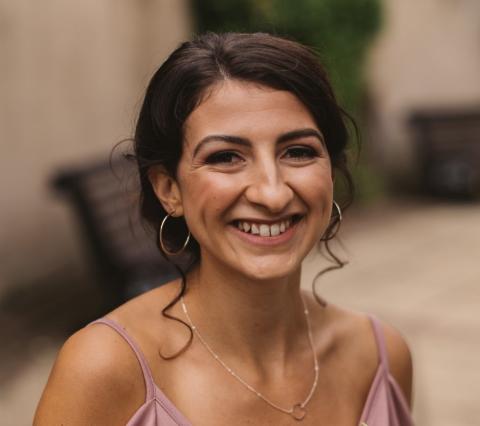
Susannah Cox
Date joined:
I work for Anawim, Birmingham Centre for Women, as part of a pioneering project which connects women’s prisons with women’s centres across England. I support many women who have had involvement from both the Criminal Justice System and Children’s Services. I have a First Class MA in Social Work and have previously worked for a local authority Children’s Services in safeguarding and assessment roles.
Building on my experience working with women in prison and in children’s social care, my research will focus on increasing understanding of the experiences of women prisoners permanently separated from their child(ren), to inform support services and practical guidance, and ultimately improve outcomes for mother and child. A greater understanding of the relationship between a mother’s experiences of child removal and of offending could contribute towards lowering risk of harm and reducing reoffending.
Outside of my job, I volunteer with several community organisations locally, including Tabor House, Restore, Safe Families and Newbigin Community Trust, as I feel passionately about community transformation, faith and social justice. Prior to my social work studies, I gained a BA Hons Modern Languages and Cultures (French and Arabic) from the University of Durham.
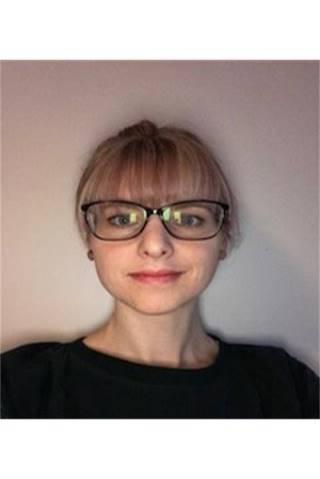
Claire Morely
Date joined:
I am currently the women’s lead for the East Midlands Probation Service. Having held various roles in the Prison and Probation service for the last 17 years, the commonality has always been my championing of women in the CJS and pursuit of practice which is gender specific and trauma informed. In my current role I have enjoyed applying this commitment in multi-agency settings and creating women’s steering groups in each county of the East Midlands which has led to the development of blueprints for Whole Systems Approaches in Nottinghamshire, Derbyshire and Leicestershire.
I have additionally played a pivotal role in the development of a new gender specific resettlement model which gained national approval to, importantly, align the resettlement approach across all women’s prisons in the country.
The Griffins research to me, is crucial, as despite the time since the Corston report was first published, a lack of knowledge and understanding remains prevalent around the need for such a distinct change to the way we work with women. Considering attitudes, and influencers to these attitudes, is vital in understanding how to make and then sustain systemic change which better meets the needs of women in, or at risk of entering the CJS.
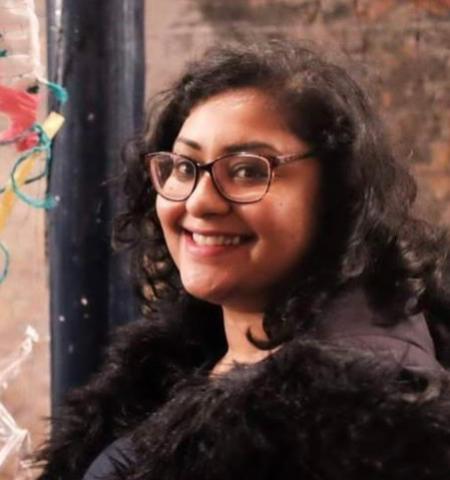
Tahera Solim
Date joined:
I am a Women’s Advocate at Women in Prison, working on the frontline supporting women involved in the criminal justice system. I work with women within custodial and community settings and work with a range of partnership organisations, including probation, prison, courts and holistic services. I have worked in the sexual violence sector at the Department of Health, and as a Community Engagement worker at the Department of Justice’s Neighbourhood Justice Centre, Melbourne, which lead me to working frontline in the field back in the UK.
I am a trained and accredited Independent Sexual Violence Advisor (ISVA), and my knowledge and experience has helped inform my practice working at the charity, Women in Prison. My role involves conducting assessments and safety planning and provide tailored support to women, and providing holistic trauma-responsive support to reduce the risk of recidivism and help the women rebuild their lives following trauma.
I am passionate about providing trauma-informed support for women who have experienced sexual abuse, and to explore the impact of sexual trauma on women affected by the criminal justice system.
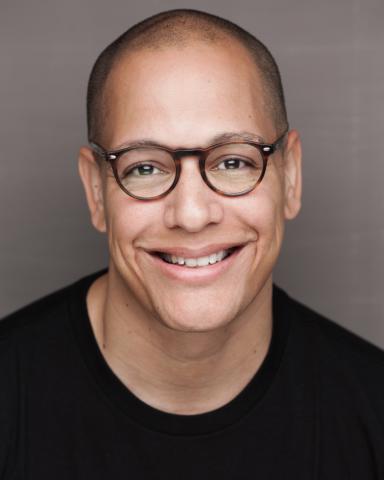
Nujoji Calvocoressi
Date joined:
I work as a psychotherapist in Europe’s only women’s prison based Democratic Therapeutic Community (DTC). This is an accredited group-based offender behaviour programme delivered via the Offender Personality Disorder Pathway. Prior to this I have worked as a psychotherapist in the men’s prison estate. In addition, I have consulted to the Independent Inquiry into Child Sexual Abuse and contributed to the Inquiry’s work about child sexual abuse in custodial settings. I have also served for ten years in the voluntary sector as a Justice of the Peace in both the Adult and Youth Magistrate’s Courts.
My Masters dissertation was a small-scale thematic analysis about the experience of psychotherapist’s working in two men’s prison, I explored some of the difficulties and challenges that impact the efficacy of psychotherapy in the setting. I am particularly interested in understanding the tensions that exist in prisons between care versus control and inclusion versus exclusion.
The work that takes place in the women’s DTC is hugely under-studied and the Fellowship programme offers a wonderful opportunity to advance knowledge about women convicted of the most serious offences by informing practice and influencing policy. I will be undertaking the research study with my colleague and Fellow, Sophie Crilly.
Our research study will explore the experience of former DTC participants who have successfully completed the intervention and remain in custody serving the remainder of their sentence. We are interested in the sense the participants have made of their experience of the DTC since leaving and returning to a typical prison location.
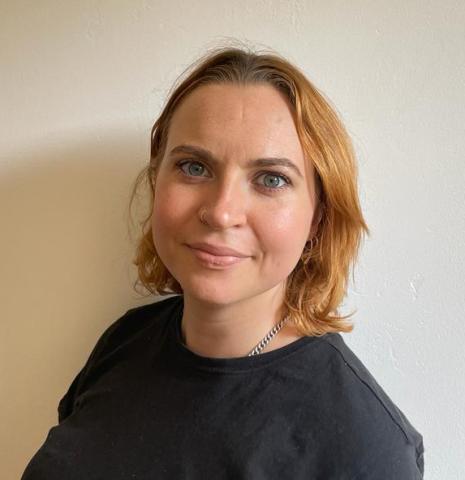
Georgina Sheeran
Date joined:
I am a trained gender violence specialist, hold an MA in Law and most recently I developed the first national service meeting the needs of people with remote hearings with Support Through Court. It was learning from clients on the remote hearings service where I began to notice the gap, I perceive in the effectiveness of remote hearings in supporting vulnerable people. I hope that my understanding of working with vulnerable women and girls, of the criminal justice system and at the forefront of the new remote hearings will help me see the process in a new light and result in findings that can shape the future for remote hearings, improving them for those that need. I am looking forward to getting started and testing my hypothesis.
As an advocate for survivors of domestic and sexual violence, I worked nationwide to improve outcomes for my clients and shape future policy moving forward. Working on one of the first combined courts in Derby with Refuge demonstrated the need for joined up jurisdictions when working with domestic abuse, these findings form the basis of the DA Bill that came through this year. I train professionals in the dynamics of abuse and working with vulnerable people in the legal sector and speak at universities and on podcasts on Access to Justice.
Remote hearings are here to stay, and I am hoping that my findings can make a real difference moving forward in the provision of support for vulnerabilities of any kind at remote hearings.
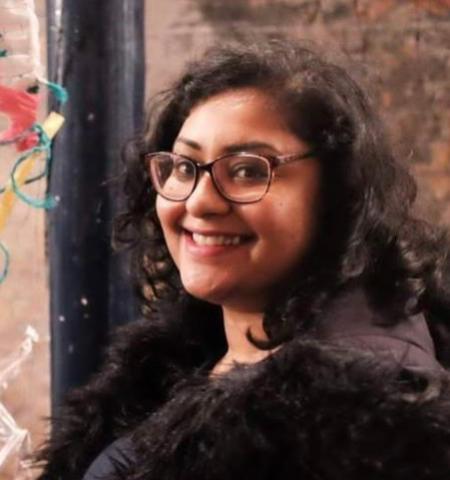
Tahera Solim
Date joined:
I am a Women’s Advocate at Women in Prison, working on the frontline supporting women involved in the criminal justice system. I work with women within custodial and community settings and work with a range of partnership organisations, including probation, prison, courts and holistic services. I have worked in the sexual violence sector at the Department of Health, which lead me to working frontline in the field.
I am a trained and accredited Independent Sexual Violence Advisor (ISVA), and my knowledge and experience has helped inform my practice working at the charity, Women in Prison. My role involves conducting assessments and safety planning and provide tailored support to women, providing holistic trauma-responsive support to reduce the risk of recidivism and help the women rebuild their lives following trauma.
I am passionate about providing trauma-informed support for women who have experienced sexual abuse, and to explore the impact of sexual trauma on women affected by the criminal justice system.
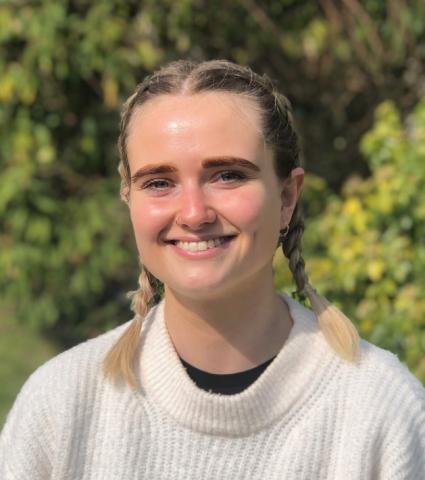
Sophie Crilly
Date joined:
I am a group facilitator in a female prison-based Democratic Therapeutic Community (DTC), an accredited offending behaviour programme for women with complex needs, delivered by HMPPS and the Offender Personality Disorder Pathway. I have worked in this role for 2 and a half years; prior to this I studied for my Undergraduate and Masters degree in Forensic Psychology. Here I undertook research into the social psychology of stigma around mental health and different types of offending. I have experience working in the NHS forensic services as an honorary assistant psychologist, and I have also volunteered with a charity providing emotional telephone support to people who have experienced sexual abuse.
The Griffin’s society fellowship will provide an excellent opportunity to combine my passion for research with my frontline work, and provides a platform to better understand a unique service for women that is currently lacking in research.
I will be undertaking the research with my colleague, Nujoji Calvocaressi. Our research study will explore the experience of former DTC participants who have successfully completed the intervention and remain in custody serving the remainder of their sentence. We are interested in the sense the participants have made of their experience of the DTC since leaving and returning to a typical prison location.
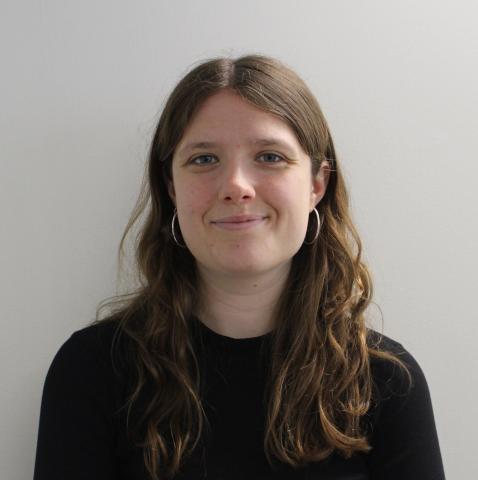
Lucy Slade
Date joined:
I am a member of the policy team at the Centre for Justice Innovation, a non-profit organisation dedicated to building a fairer and more effective justice system. I work on a number of projects that look at how the justice system works, and how it might work better. Often this involves championing evidence-based alternatives to the use of imprisonment, and making the case for them to a range of political stakeholders. I particularly enjoy working on projects at the Centre that focus on where the justice system intersects with issues social and economic inequality, and developing thinking on how we can build a system that treats every citizen fairly.
I previously worked in European public policy, running events on EU integration and combining my passion for cycling and policy at the European Cyclist Federation in Brussels. I have a Master’s degree in Human Rights from University College London, and a Bachelor’s degree in History and Politics from the University of Manchester.
Through this fellowship, I will be able to explore the challenges we have observed women with children encountering at the magistrate’s court in London, where my organisation runs an advice and support service. I jumped at the opportunity to evidence this issue and speak to women about their experience, and to begin to understand how the justice system can better meet their needs at court.
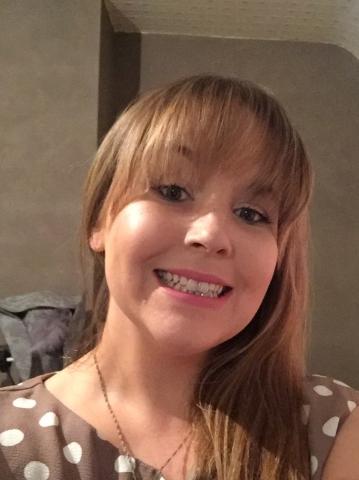
Claire Rushton
Date joined:
Until April 2021, I worked as an Interventions Manager at the Divisional Sexual Offending Unit specialising in working with women who have sexual convictions and then as the Operational Lead at the UK’s largest Psychologically Informed Planned Environment Approved Premises for women. In these roles, I witnessed the extent to which trauma featured in women’s offending and the disproportionate use of punishment as a response to their social injustice which led to re-traumatisation in the criminal justice system. I developed an interest in listening to women’s stories which now influences my attempt at improving outcomes as a regional Women’s Strategic Lead for the Probation Service.
With previous degree qualifications in Psychology and Criminal Justice, I have recently gained a Masters degree in Applied Criminology, Penology and Management at the University of Cambridge and have a real interest in using participatory research and lived experiences to inform policy development. I am passionate about the value of a truly whole-systems approach to working with women and to this end have recently been involved in setting up a multi-agency delivery group for women and girls in the criminal justice system and a healthcare project focused on improving health outcomes for marginalised women.
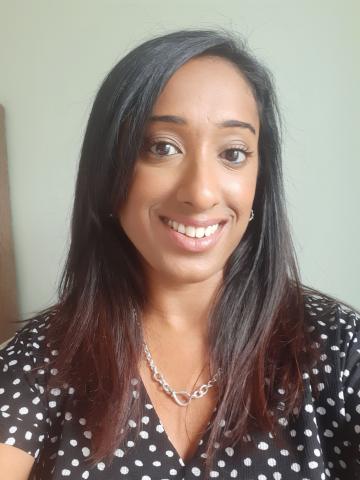
Neesha Honmong
Date joined:
I am a Forensic Psychologist working in the Women’s Estate Psychology Service (WEPS) in Her Majesty’s Prison and Probation Service (HMPPS). I have been working in prisons for 12 years and have become passionate about the rights of the residents we support, and making sure we can offer them the best care and opportunities possible. My role involves conducting risk assessments with and delivering interventions to women, in order to help them reduce their risk of reoffending. I have delivered lectures to MSc students on women in prison, and I am one of the Diversity and Inclusion Lead Psychologists for the WEPS South Team, a voluntary position which enables me to try and make positive changes for women and staff with protected characteristics. I have a BSC in Psychology, an MSc in Forensic Psychology and a Postgraduate Diploma in Practitioner Forensic Psychology. Ethical and evidence-based practice is important to me, and I work with residents in a trauma-informed manner, recognising their vulnerabilities as well as their risks.
I was inspired to apply for this fellowship, having conducted a literature review about BAME women in prison. I realised I wanted to be part of helping to make changes, instead of just reading about them. From what I have found out and observed, BAME women in prison face a unique set of struggles, many of which are compounded by their experiences as women of colour. I hope my research can contribute to a greater understanding of their needs.

Audrey Cherryl Mogan
Date joined:
I am a barrister at Garden Court Chambers, where I specialise in criminal defence, public law and human rights. I appear regularly in the Crown Court, youth and magistrates’ courts and am a member of Garden Court’s protest team and child rights team. I represent a wide range of individuals from those protesting against the lack of action on climate change and war crimes, to vulnerable defendants with mental health issues and drug addiction.
I have given training on the issue of indefinite detention of children, the use and abuse of gang rhetoric in criminal proceedings and trafficking issues, and have successfully challenged the requirement for defendants to give their nationality in criminal courts. I am also currently a director of Black Protest Legal Support, a grassroots organisation founded during the BLM protests, which provides pro- bono legal assistance to protestors, and trains legal observers to monitor protests on the ground. I have an MSc in Human Rights from the LSE, and prior to coming to the Bar I worked in the NGO sector for ten years, in genocide prevention and European human rights law.
I am regularly instructed to defend individuals, especially children and young people, who show indicators of trafficking and modern slavery. Through my practice I have noticed the positive development of more criminal practitioners identifying indicators of trafficking and ensuring defendants are referred through the National Referral Mechanism. However, I have also noticed that many victims of trafficking continue to be prosecuted for crimes committed arising out of their exploitation. This was the impetus for my research proposal, where I aim to look at how the prosecution review cases where individuals have been identified as victims of trafficking.
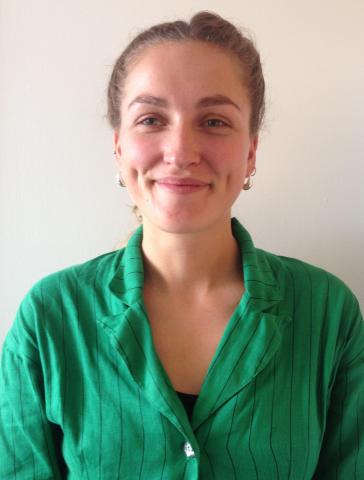
May Robson
Date joined:
I am a community project worker at Hibiscus, a charity that supports foreign national women affected by immigration restrictions and the criminal justice system. I provide support and advice to women in the community and help coordinate our specialist Women’s Centre, where I run podcasting workshops. I previously worked with Survivors Speak OUT, an activist network of asylum-seekers and refugees who have survived torture based at Freedom from Torture. I completed an MSc in International Politics at SOAS, London. My insights into the injustices experienced by foreign national women inspired me to apply for this fellowship and use research to advocate for change.
